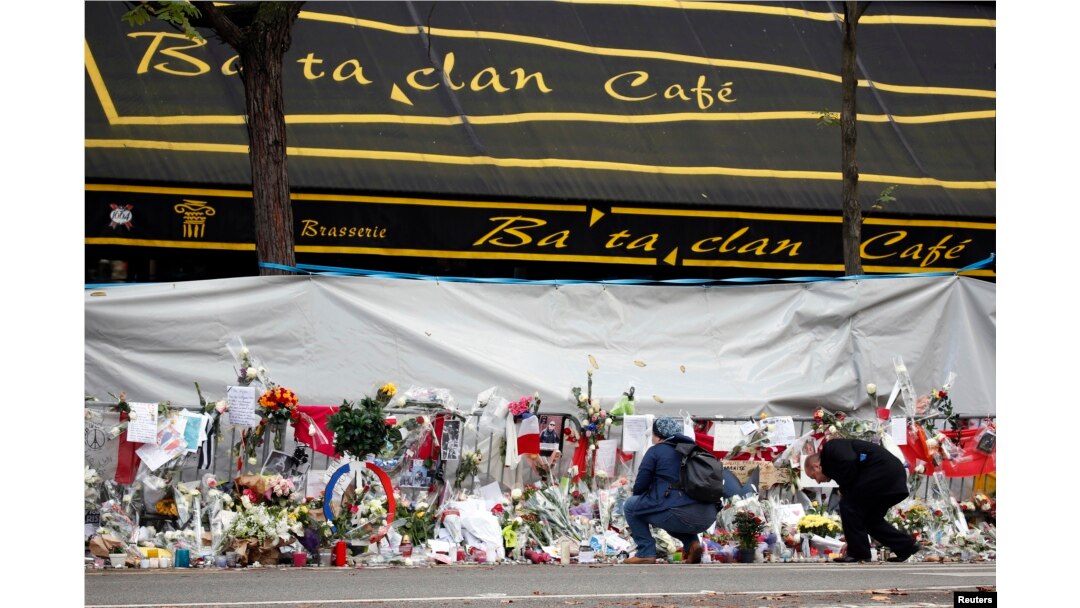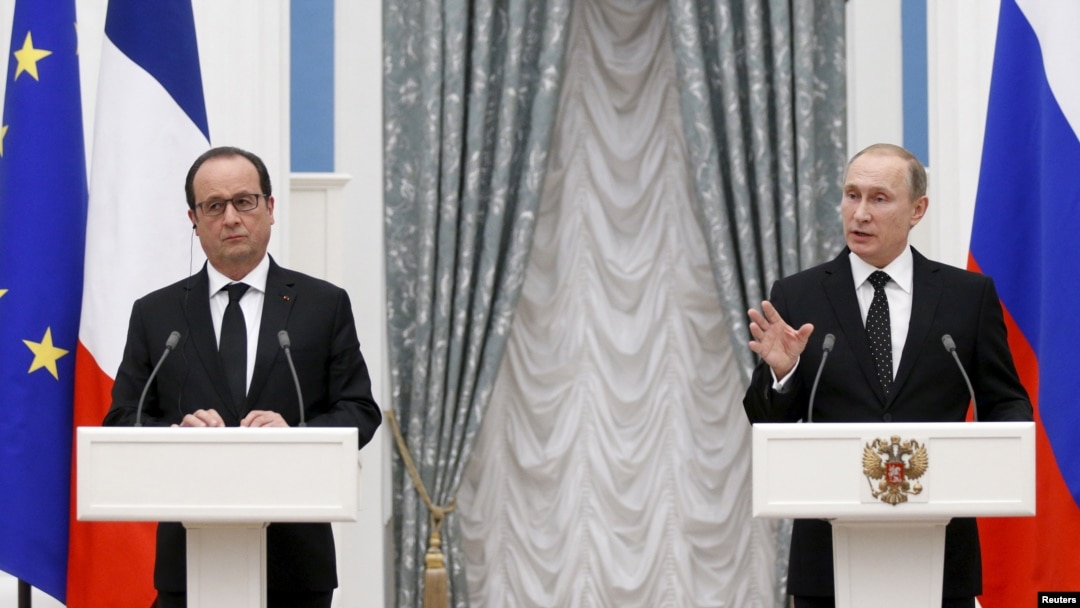French President Francois Hollande said Thursday that he and Russian President Vladimir Putin had agreed to exchange intelligence on the Islamic State militants and other extremist groups in Syria to maximize the effectiveness of their bombing campaigns.
"We will exchange information about whom to hit and whom not to hit," Hollande said during a news conference after the two leaders met in Moscow. "What we agreed, and this is important, is to strike only terrorists and Daesh [IS] and to not strike forces that are fighting terrorism."
Putin said Russia was open to greater cooperation with France and the U.S. in picking IS targets.
Hollande was in Moscow on a diplomatic mission to build an offensive force against IS that has also taken him to the U.S., Germany, Britain and Italy.
He and Putin were to discuss coordinating more closely in the fight against their common enemy while seeking a political solution in Syria.
France and Russia have both faced recent terror attacks. IS claimed responsibility for the November 13 attacks in Paris, which killed 130 people and injured more than 300, and the October 31 downing of a Russian plane over the Sinai Peninsula in Egypt, which killed all 224 people on board.

People mourn in front of the screened-off facade of the Bataclan Cafe adjoining the concert hall, one of the sites of the deadly attacks in Paris, France, a day before a ceremony to pay tribute to the 130 victims, Nov. 26, 2015.
'Mutual enemy'
Putin said before Thursday's meeting that Moscow was ready to unite with Paris against a "mutual enemy" following the downing of the Russian airliner and the attacks in Paris.
However, the exchange between the two leaders was awkward because of strained relations between Russia and the West over the crisis in Ukraine and differing policies in the Middle East.
Any cooperation is likely to be complicated by Russia's own military operation in Syria, which is aimed at ensuring the survival of Moscow's longtime ally, Syrian President Bashar al-Assad.
Middle East policies
Russia has repeatedly tried to portray its military campaign as targeting the Islamic State group, even though many of its strikes have instead targeted Western-backed rebels.
In an interview with Al-Hurra TV in Baghdad this week, U.S. Deputy Secretary of State Antony Blinken said Russia's intervention in Syria was aimed at helping al-Assad. He said 85 percent of Russian airstrikes in Syria had not been directed against the Islamic State group.
Putin said at the news conference Thursday that the "army of Assad is the natural force to fight terrorists."
WATCH: Related video of British Prime Minister David Cameron's speech
Your browser doesn’t support HTML5
Britain's Cameron: It's Time to Bomb Militants in Syria
Meanwhile, Western allies pushed ahead Thursday with efforts to expand an international coalition to fight IS.
In a speech to Parliament, British Prime Minister David Cameron made an urgent appeal for his country to join coalition airstrikes against Islamic State in Syria, asking, "If not now, when?"
"We have to deny a safe haven for ISIL in Syria," Cameron said, using an acronym for the group. "The longer ISIL is allowed to grow in Syria, the greater the threat it will pose."
"It is wrong for the United Kingdom to subcontract its security to other countries," he added. “We do face a fundamental threat to our security. We can't wait for a political transition; we have to hit these terrorists in their heartlands right now.”
Cameron said U.S. President Barack Obama and France's Hollande had urged London to join the campaign. "These are our closest allies, and they want help," he said.
Britain has participated in coalition airstrikes against Islamic State in Iraq, but not in Syria. Cameron had said he would bring the issue to a vote, but only when he was assured the measure could pass.
Striking in Syria
Striking Islamic State from the skies over Syria may reduce the threat, but it won’t make the West safe from attacks like those in Paris, said Michael Stephens of the Royal United Services Institute.
“What we need to be careful about here is to overemphasize the control that Islamic State has on attacks which occur in Europe, or even in the Sinai. I think there is some evidence that those were slightly autonomous — and that’s a completely different issue. That’s a homeland security issue," Stephens said.
Analyst Sajjan Gohel of the Asia-Pacific Foundation said the airstrikes would not defeat the Islamic group, though: “They don’t hurt the group’s infrastructure. More needs to be done to dismantle ISIS on the ground.”
FILE - French President Francois Hollande (R) and Britain's Prime Minister David Cameron attend a joint news conference at the Elysee Palace in Paris, France, Nov. 23, 2015.
Also Thursday, German Defense Minister Ursula von der Leyen said the government had agreed to send reconnaissance aircraft, tanker planes and a warship, as well as provide satellite surveillance, to help France in the fight against Islamic State.
The already complicated situation in the region was thrown into further disarray Tuesday when Turkey downed a Russian jet near the Syrian-Turkey border, killing one pilot.
Henry Ridgwell in London contributed to this report. Some material for this report came from Reuters and AP.


